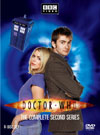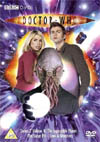DVD Extras (box sets only) include:
I will tell you that this is in fact the best Doctor Who story in the first three years that Davies and company produced since reviving the show in 2005, and it is the best because it does so well at just getting everything right. Most of all, it seems to understand, better than ex-producer Philip Hinchcliffe, better than ex-writer/script editor Robert Holmes, better than current head-writer/executive producer Russell T. Davies, better than all the horror Who fans out there, what really lies at the core of good science fiction when the genre is at its most definitive. Science Fiction's primary story beat is exploration, whether it's exploring a place, a new scientific concept, a social idea, a character, a culture... whatever. "The Impossible Planet" goes to the top of the rankings primarily because it just never stops exploring, no matter what other great stuff is going on. Hats off to writer Matt Jones! In fact, Jones should come out and take a bow, before Russell T. Davies takes credit for all the good ideas in the interviews on the DVD extras.
The series' two regular characters present themselves to the audience and waste no time in getting underway with the explorations. They start with the construction they find themselves in, proceed to some ancient writing and its ramifications (very nice cultural touch), and then discover what is probably the best new alien race to debut on the revamped show. The Ood have arrived, with one of the best prosthetic designs ever produced for television, and a mysteriously unnerving character to boot. Nice! Meeting the rest of the base's crew is not the greatest display of fascination or charisma, which in a way adds to its realism. Most importantly, this section introduces us to the characters quickly and efficiently covering basics like names, functions, and general disposition, and still leaving room for more interesting mysteries and developments to spring forth later. Better than so many earlier Doctor Who offerings that leave you still wondering which character was which when the episode credits roll. Good job.
"Krop Tor: The Bitter Pill"Only after all this do we get to find out exactly where we are for this adventure. We know we're out in the frontiers of outer space, but for those who had any doubt, this is not just another run-of-the-mill space craft or orbital station. We've finally landed on an alien planet that is truly alien and not making any attempt to copy the Earth. Sweet relief; we thought it'd never happen! It's got its own ancient lost civilization and culture, whose secrets are locked in a truly ancient language that gives everyone translation challenges. And to make it truly bizarre and give it even more eye-candy, it's in orbit around a beautiful black hole. Awesome. Note also here, that the characters are now exploring astronomy and physics, as the how and why of the place's set-up is made into another major set of questions to be answered during the adventure. Very on-purpose. This is why it's called science fiction, ladies and gentlemen.I can't think why science officer Ida Scott rags on about the planet not having a name, when she later proves that she knows that the Veltino call it "Krop Tor". Okay, so if that's the only name we know it's got, then that's its name. Sounds good to me. It really is beautiful having so many different cultures in one story, the Ood from who knows where, the undiscovered one on Krop Tor, and reports of even more cultures commenting on the planet in question. Cool. Of course, we're not without the usual Russell T. Davies love-in for the human race, which early on here seems to be presented a little weirdly, threatening to jar one out of context. The typical formulaic base-defense bottle-story dynamics come into play for a while, as the narrative explores both day-to-day life on a deep-space base between Humans and Ood (with a little help from a rendition of Ravel's "Bolero"), and the idea of a TARDIS-less Doctor settling down, onto which Rose clumsily throws her domestic hopes. No, we don't think so, Rose. And just what is happening to Toby? His exploration of the ancient language yields some truly bizarre results. This section of the story fills itself with questions, spectacle, and danger. Just when you think you may have this story's structure pegged and think it may be settling down into a familiar formula, it shifts gears again, and begins its greatest literal geographical explorations yet, with the Doctor taking a lead role. Sweet. The build up to the cliffhanger is truly exquisite. Having shown us so many curious visuals already, it begs us to imagine even more as a triple threat grabs hold, questions abound, and new twists and dynamics in the following episode seem inevitable. It is a shame that this episode makes no attempt to follow the fine example set in "Rise of the Cybermen" (story no. 176) when it refrained from embedding an ad for the next show directly into the end credits. Those ads really suck, and are really out of place in the DVD box set presentation of the actual show. Hide them somewhere on the last disc as an extra, and let the episode credits run in peace to a good music cue without the ads. Particularly on the multi-part stories, if the episode and cliffhanger has done its job well, there's no need to make a separate ad for next week. The viewers should already be hooked. The following episode starts off by delivering a lot of good old-fashioned sci-fi action to the story, and working through many of the rest of the bottle-story dynamics that one may have been anticipating. At the same time, it continues to deeply explore questions of faith, belief, mythology, legends, and fear, with the Doctor neatly shining a bright philosophical light through the ensuing debates keeping everyone in the moment, resourceful, capable of holding their own against the enemy forces. The story is also tastefully peppered with a little humour to help relieve the enormous tensions it builds so well. The full range of what works best in sci-fi is all here for your indulgence. Early in the fourth quarter, the narrative wraps up the more predictable base-defense dynamics, and gracefully and logically shifts gears yet again. New visuals and territory are entered into on several fronts, while more intellectual, strategic story beats take over, as the Doctor struggles to outwit his opponent and fill in all the missing pieces of this story's puzzle. And he has to answer his own questions of faith to do it. Now this is what a Doctor Who story should be. Good stuff. In fact, Claire Rushbrook even makes Ida Scott into a very successful temporary companion for the Doctor, and has great chemistry with David Tennant. It's enough to get me wishing that the Doctor didn't go through with the swap at the end of the story that brings Rose back. Oh well.... The one lasting caveat I have is for the treatment of the TARDIS at the end of the story. We have LOTS of opportunity to show extra materializations, and the story bypasses them ALL. Unforgivable. Of course, they don't want to bother with a set for the hold where the TARDIS makes one of its most important appearances, but they could at least have done a green screen and painted a set in. Viewers who are unfamiliar with the vehicle really aren't getting enough visual cues to understand what's going on, and "The Impossible Planet" contributes to a season where just about every story assumes that the TARDIS has been demonstrated in other previous episodes and that the audience already gets it. Too much passing of the hot potato for my tastes.
International Titles:Deutsch: "Der unmögliche Planet"
Magyar: "Képtelen bolygó"
Русский: "Невозможная планета"
This story has become available on DVD. Click on the Amazon symbol for the location nearest you for pricing and availability:
Note: The full season sets contain commentaries, behind-the-scenes featurettes, and other extras. The smaller volumes only feature the plain episodes. Comments on this article are welcome. You may contact the author from this page:
|









